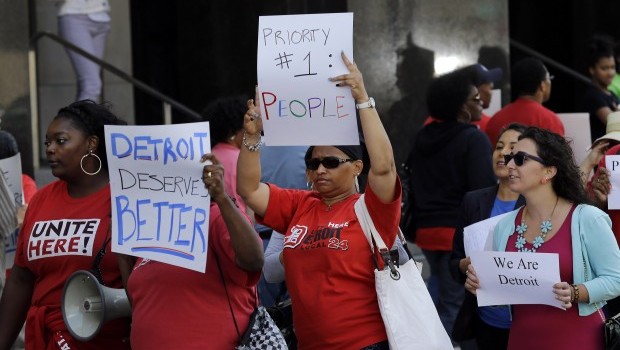All of a sudden, one of the largest American cities announces that it is bankrupt. Detroit, known “The Motor City,” or “Motown” for short, is the capital of the US automobile industry and the heart of African-American music. It declared bankruptcy after years of continuous decline and collapsing infrastructure, massive decreases in population, the accumulation of debt, and a dramatic reduction in resources with big companies fleeing or going bankrupt. Though the result was expected, it still came as a shock.
Detroit has been the headquarters for US automobile giants such as General Motors, Ford and Chrysler. As a well-known American proverb says, “Wherever General Motors goes America goes.”
The automotive industry has been traditionally based in the state of Michigan, particularly Detroit, for many years, but there has been much drawing the industry away and southwards. Over the years, many foreign companies, such as Toyota, Nissan, Honda, Mercedes, and BMW, have opened factories in southern states such as Alabama, Tennessee, Texas, South Carolina and others. These companies achieved tremendous success within the US domestic market but also with exports. The north has always dominated since its victory during the American Civil War, but the south has become more powerful and influential industrially in some specific ways. Poorer southern states, such as South Carolina, Arkansas and Mississippi restored many of their industries after American firms migrated to the Far East due to low wages and the ongoing financial crisis in the US.
It is also part of a global trend where economic weight is being transferred from countries of the north to countries of the “Global South.” The economic crisis gripping Europe and the United States, the largest economy in the world, has coincided with impressive economic performance in countries like Brazil, India, South Africa, Argentina, South Korea, Indonesia, Malaysia, Thailand and many more of course.
What happened in Detroit with great force can be expected to be repeated in other cities reeling under the impact of the economic collapse. Philadelphia, the city that witnessed the writing of the US Constitution and the toll of the famous Liberty Bell, is expected to be exposed to the effects of the crisis. The city has experienced large migration of businesses, rampant crime, and sharp deterioration in infrastructure.
This is the case of many other cities who share the same symptoms. The “global north” suffers from chronic problems where society is aging rapidly and population growth rates are low. This means that with time, some cities will be unable to provide manpower for self-sustained economic growth, and must resort to migrants—an issue that worries “nativists” or extreme right-wingers in these countries. Health sectors will suffer greatly as well, given the pressure they face and the difficult complications that accompany aging citizens.
This will compel some European economies to gradual steer towards becoming service-based, as opposed to industrial, economies, while maintaining a strong presence in the field of agriculture. However, heavy industries in Europe will continue but without heavy reliance on traditional manual labor. Detroit’s bankruptcy is a wake-up call and a warning of what other economies might face. It is a cause for caution and for making essential changes.
